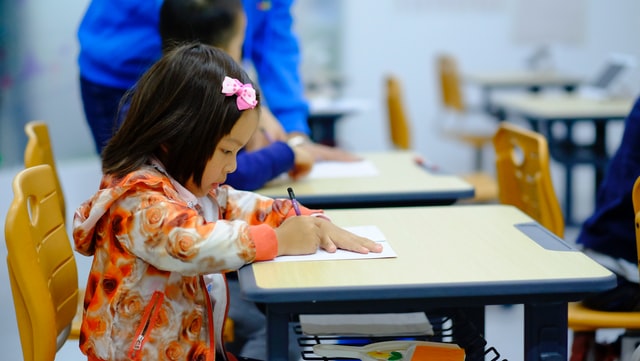If you love teaching, you might love our Teach in China program. You get to live and work in China as an English teacher. We have many different school options. Believe it or not, both the flight and the visa cost are actually included in the program. Plus, you have free accommodations and a salary of $1900 to $3000 per month.
But before you start teaching, let’s envision your relationship with your students. What will it be like? How will you help them learn? Here are 8 ways to have a good relationship with your students.

- Do: Interact with your students
The sky’s the limit for how to interact with your students to help them learn a language. Rule number one: it should be fun and not feel like an obligation. Your school may have a specific curriculum for you. Or you might create it yourself. Either way, make it fun!
If you teach children, you can consider activities that will be more interactive. Make bubbles, paint, play games, tell stories and jokes, read books, watch movies (occasionally), and be creative in your activities! Chinese children often have very intense schedules. Let English be a fun time, not another pressure-filled activity. - Do: Care about them
Anyone, even a young child, can feel when you’re being sincere and when you’re faking it. So believe it or not, your students will know when you’re having fun with them and when you consider it a chore to be with them. Relax and have fun. Ask your students questions about themselves so you can get to know them. You should also open up and tell them about yourself. Think of your time with them as a learning and growing experience (for them and for you!). With that mindset, it will be much more enjoyable for all of you. - Do: Talk. A LOT.
Remember, one of the school’s main goals is to help their students improve their English skills. One of the best ways to do this is by talking, talking, talking. You should also give them opportunities to talk (to you or to a partner). Some ways to increase the verbal dialogue in your classroom are:- Tell stories (both fictional and from your personal life) and tell them repeatedly
- Ask them to share stories with a neighbor
- Do activities with the students and narrate what you’re doing
- Ask them a lot of questions and talk about their answers
- Generate ideas together (‘what if’ scenarios are fun to do here)
- Do: Be patient but keep tabs on their progress
Helping students learn English doesn’t need to be intense or even charted. If your students are having trouble with certain sounds, words, or phrases, be patient. Even native speakers take a few years to learn their own language. (Remember, it took Einstein four!) So be patient and kind in your corrections. If a student makes a mistake, just repeat the phrase in the correct way without pointing out their mistake. For example:
Student: It go like this. [Incorrect]
Teacher: Oh, it goes like this? [Correct]
Doing this will help them naturally correct their speech without making English a negative experience. In a private notebook, keep track of how well the students are progressing in their English skills. If they’re having trouble with a difficult sound like ‘r,’ ‘l,’ make note of it and chart their progress. - Don’t: Get angry
Kids will be kids; they will probably do something annoying or unfriendly at some point (this goes for adults too!). Depending on their maturity, this could include screaming, disrupting a lesson, or simply being irritating. Whenever this happens, remember to be the bigger (more mature) person. If you need to, take a break from the situation.
If you need to talk to your superiors about misbehavior, do so from the perspective of we. For example, “[Student’s name] is very good at [note a positive]. However, I noticed that [Student’s name] acted in this way in this situation [describe]…How can I help him/her act more calmly in those situations?” What can we do to improve this?” You can also ask what has worked for them. If necessary, you can come up with a plan together of how to handle the behavior. Stay in touch with your program director about these situations. If a student physically hits you or does something else to hurt you, tell Rome Abroad right away. Remember to work through problems with the long-term in mind. - Don’t: Leave a mess
This is probably common sense, but we like to err on the side of being overly clear. If you or your students make a mess, clean up after yourselves. Leave things better than you found them. - Do: Remember to be grateful
Saying thank you goes a long way. This is true in the program and in life generally regardless of culture. A simple ‘thank you,’ when spoken sincerely, can make the difference between a positive experience and a negative one. Can you remember a time when you did something nice for someone and it didn’t even cross their mind to say a simple thanks? How about when someone went out of their way to tell you thank you? Who would you want to be your teacher?



0 Comments